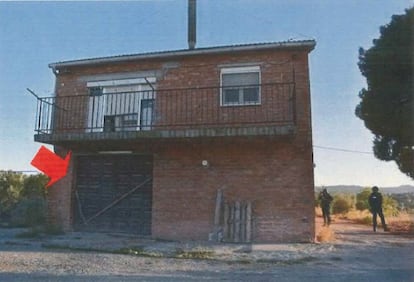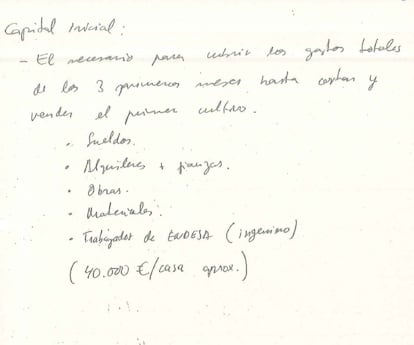At 25 years old, Pol Cugat was trying to get ahead on his own. “He didn’t want anyone to help him,” explains his mother, Carme Peguero. For this reason, when he found himself penniless, he went to guard a marijuana plantation, with the help of an old school friend, in a remote farmhouse in Les Borges Blanques (Lleida). “If they had proposed to him to keep cocaine, he would have said no, no joke,” adds the family’s lawyer, Josep Lluís Jordan. The work lasted about three months. On October 21, 2021, Pol was murdered in his precarious job, which his parents were unaware of. Since then, his body remains missing. “You can’t say goodbye, you can’t close the circle, and you wonder where you’ve failed,” laments his mother, who only hopes that one of those involved in the plantation will break the omertaand talk about a crime that they tried to mask as a narcoassault.
At least seven people know details of Pol’s murder: this is the number of defendants held by the investigating court 4 of Lleida. Two of them came to see his bloody body, with a bag over his head, lying on his back on a mattress, with his hands tied behind his back. They found him on a Thursday on the first floor of the Les Borges Blanques farmhouse where he lived, but they did not report him to the Mossos until Saturday. And when they did, it was in a “confusing and imprecise” manner, without even providing a specific address of the house, according to the police report. Well advised, they went with their lawyers and left their cell phones at home.
The family’s theory is that it took them two days to go to the police to hide the traces of the crime and collect the marijuana they were growing in the basement. The Mossos only found the remains of a sophisticated plantation, with loose cables from computers, fans and lights, and the stained mattress on the first floor next to the pruning shears with which they suspect they killed him. On the day of the murder they packed the crops indoor to send him to Italy, the lawyer speculates. And that day they also had to pay the 12,000 euros agreed to Pol for the three months of custody. Previously, the young man from Barcelona had already told his friends that he had a lot of problems with his boss, that she “annoyed him”, that the relationship was “fatal” and that he was going to ask for all the money they owed him and he was going to leave He also complained to his mother, but without telling her that she was guarding a plantation. “He told me that he was a forest guard, a gardener,” he remembers.

Before the police, those who found Pol dead introduced the hypothesis of overturn: that other traffickers had killed him to steal the drugs. And the Mossos considered it as a possibility that caused, according to the family, that finding the body was not prioritized. “We felt very alone,” Carme laments, about the first searches. He believes that the Mossos approached it as another case of drug trafficking. “They didn’t even mobilize Civil Protection or the firefighters,” he explains, about the expeditions to locate his son. From those early days, he still remembers mosso that the deployment of friends on the ground made them ugly: “Now I will have to keep an eye on you because you are from Barcelona and you will still fall here.” “We went one way and the police went the other,” he summarizes. They were also not offered emergency psychological support. “I looked for the Mossos team to care for the families of the disappeared,” he complains.
The family had to wait for the drug assault to be ruled out to feel the effort to find their son, a normal, happy boy, dedicated to the mountains, who had worked in everything: in a nursing home, disinfecting pig farms, in the bar in the town… The Mossos searched for him with drones and dogs, without success. While the investigators closed a circle that soon narrowed around one person: Alberto B., the 46-year-old man linked to the Borges Blanques plantation who did not show up to report Pol’s death, as he had agreed with the rest. , and which has since disappeared. Others involved pointed him out, and the reconstruction of what happened led to him.
What affects the most is what happens closest. So you don’t miss anything, subscribe.
Subscribe
One of the keys is Pol’s car, a Renault Modus, which was found one day after his death, parked near the agronomists’ faculty in Lleida. Cameras showed a man exiting the vehicle, wearing a distinctive hooded jacket and a white stripe on his upper arm. The same jacket that Alberto B. wears shortly afterwards when he takes an AVE to Barcelona and when he shows up at his mother’s house. Whoever drove Pol’s car was stained with his blood, because it was found on the pedals, where the driver’s foot rests, and on the driver’s backrest. They also found Pol’s blood on Alberto B.’s sneakers when they searched his house and on the Golf that the investigated person usually drove. All this, together with the fact that he had not shown up to report the death at the police station, that his phone was in airplane mode the entire night in which it is suspected that they disposed of Pol’s body, and that he had vanished overnight. The morning they made him the main suspect.
In the eight months that he was missing, the police reconstructed the life of Alberto B. His environment defined him as a man addicted to cocaine, very aggressive, who lost his temper when he used it. This is also demonstrated by his police record, for crimes such as illegal detention, attacks on authority or mistreatment. He lived a high standard of living, drove luxury vehicles, wore expensive clothes and paid in cash, with no known job. In the searches in the room he rented in Barcelona, the Mossos found various notes about the cost of starting a marijuana plantation and the benefits he intended to obtain.

On June 23, 2022, Alberto B. appeared at a Mossos police station. Before, he had visited his mother, with a very poor appearance, long hair and very thin. His brother threatened to call the police, and in the end he came. “I know you are looking for me, I am not hiding from anything,” he told the agents. The judge ordered his imprisonment for the murder of Pol, where he remained until April 7, 2023. Since then, he has been free with the obligation to appear in court every Monday. The instructor considers that there is no new evidence that justifies him remaining locked up, and that there is no longer a risk of destruction of evidence. Since he has been on the loose, his former landlady has denounced him for threats.
“At 25 we all do a lot of stupid things,” sighs his mother, about what led Pol to be “in the wrong place at the wrong time.” His family—his parents, his older brother, and his twin brother—are pulling. The only hope is to find his body, which they suspect is still in Castelldans, a small municipality on the way to Lleida, where they believe the murderer hid it. There Pol’s phone gave a signal for the last time. “We hope and hope that the cell phone is with the body,” confides Carme, who hopes that Google will finally agree to give them the location that they have not achieved with the telephone antennas. They also go to the media in case it helps to refresh memories. Or in case any of Pol’s supposed friends, the same ones who told her mother in court, without daring to look at her face or look at Pol’s photo, that they would tell the whole truth, keep her word. .
You can follow EL PAÍS Catalunya in Facebook and xor sign up here to receive our weekly newsletter
Subscribe to continue reading
Read without limits
_
#years #searching #Pol #Cugat #murdered #guarding #marijuana #plantation
